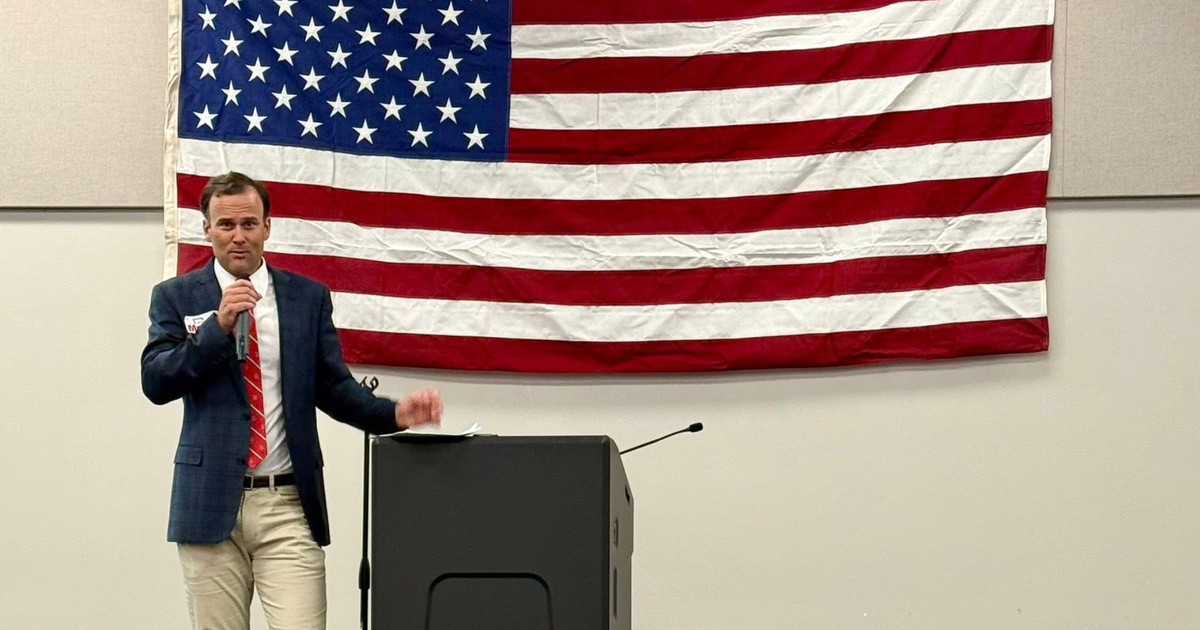Immigration bills passed in the House face uncertain fate in the Senate
Washington — The House approved two wide-ranging immigration bills on Thursday which would allow more than 4 million undocumented immigrants to gain U.S. citizenship, including farmworkers and individuals who entered the country as children.
But the bills' prospects in the Senate are far from certain. Democrats have the narrowest possible majority in the Senate with 50 seats, and most legislation requires 60 votes to advance. It is unclear whether either of these bills will garner support from at least 10 Republicans.
The American Dream and Promise Act passed in the House by a vote of 228 to 197, with nine Republicans joining all Democrats in supporting it. The measure would allow more than 3.4 million "Dreamers," or unauthorized immigrants who came to the U.S. as minors, as well as beneficiaries of certain temporary humanitarian programs, to gain permanent legal status. The bill would also allow children of temporary U.S. work visa holders trapped in the backlogged employment-based green card process to adjust their status.
All six Republicans who voted yes on the bill when it was last on the floor in 2019 did so again, with the addition of a California Republican, David Valadao, who lost his seat in the last Congress, and two South Florida Republicans, Maria Salazar and Carlos Gimenez.
Salazar, who has introduced her own immigration measure, told reporters that she had voted for the bill in a show of good faith with Democrats.
"I wanted to send the right message to the Democrats that I'm willing to work with them. Let's see if now they're going to work with us, so they will not say that 'the Republicans are the racists, or the Republicans are the uncompassionate ones.' We are compassionate too," Salazar said.
The second bill approved Thursday, the Farm Workforce Modernization Act, would allow more than a million immigrant farmworkers and their families to apply for a temporary and renewable immigration status if they have worked at least 180 days in the U.S. during a two-year period. It would also make several changes to the H-2A visa program for agricultural workers, including making visas valid for three years.
The Farm Workforce Modernization Act was approved with a vote of 247 to 174, with 30 Republicans joining nearly all Democrats in supporting it.
Senators Michael Bennet, a Democrat, and Mike Crapo, a Republican, issued a statement immediately after the farmworkers bill passed saying they would introduce similar legislation in the Senate. Crapo's support indicated there might be some Republican support for this bill in the Senate.
"House passage of the Farm Workforce Modernization Act is an important step toward bringing certainty to our country's agriculture industry and the hard-working producers and farmworkers who have sustained the nation during the COVID-19 pandemic. We will work together to introduce companion legislation in the U.S. Senate that appropriately addresses the needs of both the industry and the farmworkers that uphold it," Bennet and Crapo said.
But Democratic Senator Bob Menendez tempered expectations about the future of these two bills in the Senate, telling reporters Thursday that the goal is "to see if we can come together with a series of Republicans to see how far we can go."
"I think that's our next effort, reaching out to a few colleagues, some of whom we've spoken to individually and have interest in elements of the comprehensive bill that I'm sponsoring — maybe not all of it, but who care about certain elements on it — and see if we can amalgamate enough people to have a more significant broader effort," Menendez said.
Menendez introduced a comprehensive immigration overhaul bill supported by the Biden administration last month, which includes provisions similar to the two bills passed by the House on Thursday.
But this comprehensive immigration bill may have faced unsurmountable opposition even in the House as well as the Senate. Senator Dick Durbin, the Democratic whip, indicated to reporters that the House voted on the two bills because it would be difficult to pass the larger bill. Democrats have an extremely narrow majority in the House as well, meaning that Speaker Pelosi cannot afford to lose any votes in order to pass bills unlikely to garner Republican support.
"Even with a majority, this comprehensive is still a very difficult thing to achieve," Durbin said on Wednesday. "I'm reaching out on the Republican side. Many of them have said they are focused on the southern border. And I think that has to be part of the conversation."
Passing standalone immigration bills is a change in the modus operandi for Capitol Hill, where a comprehensive package was long seen as the key to major immigration reform overhaul that brought both Democrats and Republicans to the table. Democrats would accept more stringent border security measures in exchange for a path to citizenship for the tens of millions of immigrants living illegally in the United States, while many Republicans would only consider such legalization measures with stricter enforcement in place.
That was the backbone of the 2013 compromise bill that would have granted legal status to an estimated 11 million immigrants without documents in the U.S. in exchange for a bevy of enforcement measures along the southern border. The bill — crafted by a bipartisan group of lawmakers — passed the Senate by a vote of 68 to 32, including 14 Republicans voting yes. It later died when the Republican-controlled House refused to take up the bill.
That strategy, said one senior Democratic aide granted anonymity to speak frankly, was "one that ended up not getting us anywhere."
Now, the comprehensive bill on the horizon is President Biden's U.S. Citizenship Act, unveiled in February and introduced in Congress by Menendez and Congresswoman Linda Sanchez. The bill would create a two-tiered legalization program for a broader swath of immigrants living in the U.S., invest more in the Central American countries that are a source of so many migrants traveling to the U.S., and revamp U.S. border controls.
Members and aides say that bill will begin moving through the committee process in the House in April and May. But with no Republican support so far, the path forward is uncertain, given the Democrats' narrow majority in the House and the challenge of the filibuster and 60-vote threshold in the Senate.
So Democrats are moving ahead now with the two bills that seem like lower-hanging fruit.
"I support full comprehensive immigration reform," said Texas Democrat Henry Cuellar, whose district encompasses part of the U.S.-Mexico border. "But I know the reality is, to get 60 votes in the Senate is going to be very, very hard."
He predicted the two standalone bills "probably have a better shot at getting 60 votes."
That sentiment was echoed by Pennsylvania Democrat Conor Lamb, one of the more moderate Democrats in the House, who said that "if you break this into smaller pieces, you give the Senate more options for popular bills" like the DREAM Act.
One factor motivating the strategy is the fact that House Democrats changed the rules so they could bring bills directly to the floor for a vote before April 1 if they already went through the committee process in the last Congress, speeding up passage.
"We would be remiss to not move those two bills, with lots of momentum and bipartisanship and broad support from so many stakeholders," California Democrat Salud Carbajal told CBS News.
"We know that comprehensive immigration reform is a bigger bill and it's going to take more time," he added. "We wanted to pursue a simultaneous path to include these other two bills that have such broad support and momentum as an opportunity to be able to move forward with these bills sooner rather than later."
A senior leadership staffer said that senior Democrats followed the lead of the Congressional Hispanic Caucus and advocates who had pushed these two bills in particular as passable with bipartisan support, especially given the current dynamics in the Senate. That could signal how Biden's broader package will fare.
"These two bills will test the waters in the Senate. And passing them in the House will allow us to ride that momentum as we take a look and crack open the big bill," said a Democratic aide familiar with the American Citizenship Act.
But Republicans in the Senate may not even be willing to consider the two immigration bills, citing the recent influx of unaccompanied minors crossing the border into the U.S. GOP Senator John Kennedy told reporters on Wednesday that any immigration reform action taken by Congress needed to be prefaced by the White House working to stem the tide of illegal immigration.
"There's got to be a commitment from the Biden administration that it understands that a) it has to enforce our laws, and b) that illegal immigration is illegal. Because that's the most fundamental problem. We don't have consensus on the most basic issue," Kennedy said.
Cuellar acknowledged the dynamic might make immigration reform even more challenging than it already is.
"It's gonna become a lot harder on the Senate side to get 10 votes," even on the two bills passed in the House Thursday. And those, he said, are the ones that are easier to pass.
When it comes to Biden's comprehensive bill, the first challenge will be getting the wide-ranging Democratic caucus on board, from the more progressive members who have enjoyed newfound power in the current Congress, to more moderate members whose districts may not give them as much latitude.
Carbajal, who serves on several working groups with more moderate members, says he's hearing that his colleagues want to see "some enhancements and clarifications" to the comprehensive bill Biden put forward, including changes to the bill's current provisions on the e-verify system, caps on visas for skilled workers, and efforts to stem migration to the U.S. from Central America.
A Democratic aide familiar with the bill said its authors are still doing member education and gauging support among the caucus.
"We fully anticipate a markup, we anticipate changing this bill and making it a better bill," the aide said.
Zak Hudak contributed to this story.



